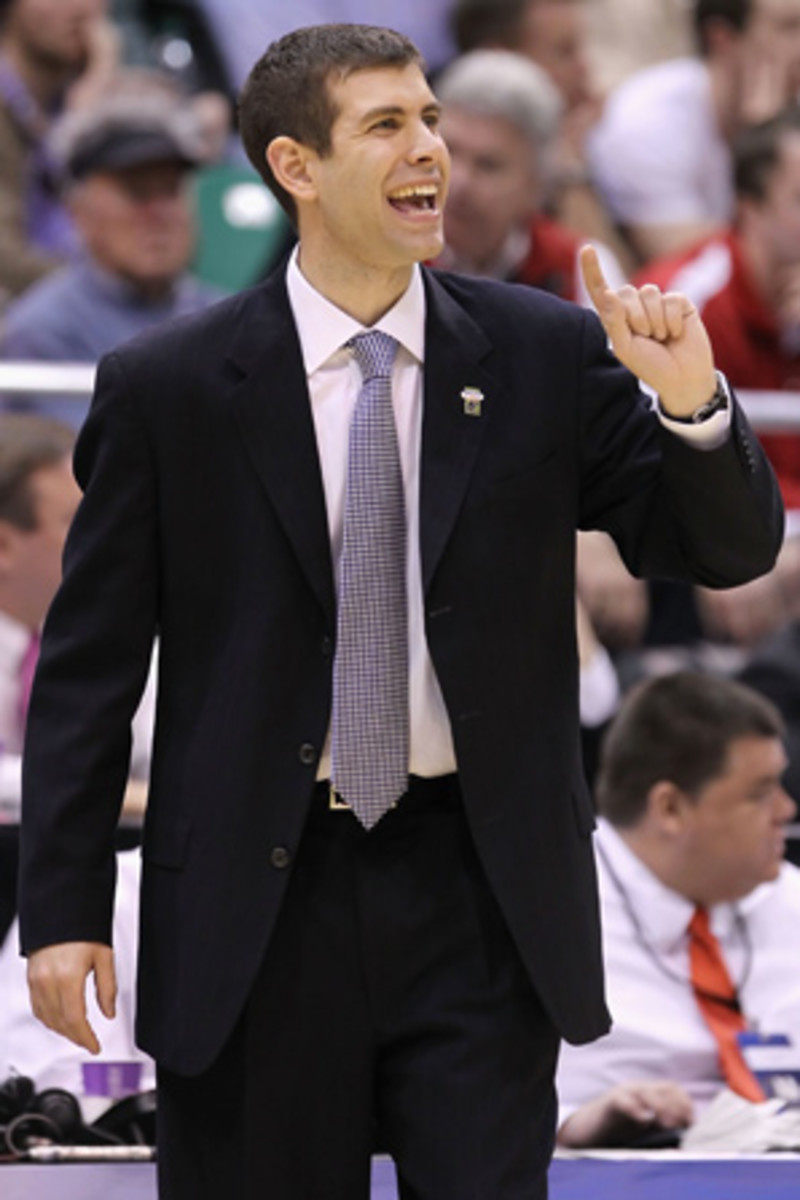
Many schools continue success by hiring young coaches from within
Since college basketball folks are never shy about copycatting something that's successful, it should come as no surprise that a number of other programs have since moved forward with their own youthful head coaching promotions.
Over the course of a few weeks this spring, The Nation's Youngest Head Coach title was passed from 30-year-old Brian Wardle (Wisconsin-Green Bay) to 30-year-old Jason Capel (Appalachian State) to 29-year-old Andy Toole (Robert Morris). All three are former assistants at their schools and are former Division I standouts who beat out more experienced candidates for their jobs and were hired, in part, to provide the same type of continuity that helped fuel programs like Butler and Gonzaga to significant national success.
Call it an updated spin on age before beauty.
"It's hard to bring someone new in," said Wardle, who spent five seasons as an assistant under Tod Kowalczyk (now head coach at Toledo). "There's boosters and fundraising that's crucial at the mid-major level that you don't have at the high-major level. I don't think you can reload at the mid-major level ... I think you need to keep things going, especially if it's going in the right direction."
Recent success is a thread that binds these three hires. While most national observers know the Southern Conference because of Davidson's Elite Eight run in 2008, Appalachian State is coming off its second season of 24 wins or more in the past four. Green Bay has won 22 games in each of the last two seasons while operating in Butler's shadow in the Horizon League. Robert Morris has 73 wins over the past three seasons and nearly knocked off Villanova in the first round of last season's NCAA tournament. All of these new head coaches are inheriting very solid growth opportunities.
That doesn't mean things will be seamless. Stevens' outrageous success (89-15 in his first three seasons) masks that he, like any other first-time head coach, had a pronounced learning curve.
"There is a difference moving down one seat, certainly more of one than I thought three years ago when I did it," Stevens said. "I tell [former Butler] coach [Todd] Lickliter all the time, 'I'm sorry. ... I didn't understand.' For me, it's so important to get a practice right and prepare that practice. I didn't understand all the preparation that went into every detail of every day like maybe I should have."
All three of these young coaches are aware that things are different now, that the proverbial 18-inch-move from the lead assistant's chair to the head coach's is much larger in reality. IPFW coach Dane Fife, still just 30 years old himself but entering his sixth season as a head coach, estimates that actual coaching is only 10 to 20 percent of what he does as the head of that program.
Wardle half-joked that becoming a head coach is like becoming a parent for the first time, in that you feel ready and have prepared yourself as best you can, but you really have no idea what it will be like. It's that preparation, though, both as former players and through mentoring relationships with some of the game's finest coaches, that positions relative neophytes like Capel, Wardle and Toole to have a better chance to succeed.
Capel comes from a well-known basketball family. His father, Jeff Jr., is a longtime coach who has worked at every level of the game and currently is an assistant coach with the NBA's Charlotte Bobcats. His brother, Jeff III, got the VCU head coaching job at just 27 years old and now is at Oklahoma. Before his time at UWGB, Wardle learned under his former coach, Tom Crean, at Marquette. Toole played for now Temple coach Fran Dunphy while at Penn and says he still speaks with Dunphy every couple of weeks, even more so during the season.
Also, none of these coaches are all that far removed from their own playing days, whether they be in college or at the professional level. They are products of the modern college game and can use that to better relate to and understand their players and potential recruits.
"I have a very vivid memory of being a college athlete. It was only seven years ago," said Toole. "I understand the rigors and time constraints they have on themselves off the court, whether it's classwork or socially or whatever it is. ... Some of the mistakes that I made in college, some of the corners I tried to cut, I know [my players are] going to try and do the same thing, and maybe I can steer them away from doing it."
In his interviews, both with athletic department personnel and others at the school, Toole hammered home his familiarity both with the program and with being a recent Division-I athlete. The tack obviously worked. When asked about Toole's hire, Robert Morris athletic director Dr. Craig Coleman said "it was unanimous that this was the direction we needed to go in."
Despite this handful of hires, it's still far too early to call this a trend, and the college basketball landscape is littered with programs that had a good season or two but couldn't sustain success. Stevens' success at Butler, though, provides evidence that it can happen if you find the right candidate.
"It's fun from afar to watch all these programs promote from within," Stevens said. "There's a reason and a culture and a tradition and a way of doing things that's been established. Even though that coach will bring his own unique twist, there's a lot of continuity that can occur that will put people at ease in the transition."




